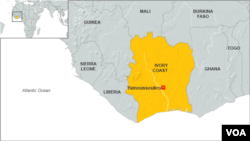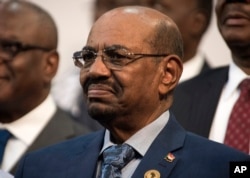The long-awaited trial of former Ivory Coast President Laurent Gbagbo got underway Thursday at the International Criminal Court (ICC) in The Hague.
Gbagbo, 70, and his close ally and former militia leader, Charles Ble Goude, are charged with crimes against humanity including murder, rape, and persecution stemming from Ivory Coast’s post-election war in 2010.
Gbagbo is the first former head of state to be tried at the ICC. Some 3,000 people were killed during the four month long conflict.
Stephen Cockburn, Amnesty International’s deputy regional director for West and Central Africa, said the trial marks a milestone in the search for justice for the thousands of victims of the crimes allegedly committed during crisis.
'Historic event'
“The opening of the trial of Laurent Gbagbo is a historic event for international justice. This is the first time that a former head of state will be tried in front of the court. It’s of course also a very grim day for the victims of the conflict in Cote d’Ivoire,” Cockburn said, referring to Ivory Coast by its French name.
Cockburn said the ICC should hold all those who committed crimes accountable, including President Alassane Ouattara’s supporters. He said it is also important for the trial to be conducted successfully, particularly for justice and reconciliation purposes in Ivory Coast.
“While Gbagbo and his former minister of youth Charles Ble Goud earned being tried, it’s important that national and international courts look at the suspected perpetrators of violence and other crimes committed during the martial law of the President Ouattara side to make sure that justice is even-handed,” Cockburn said.
Both the prosecutor and Gbagbo’s lawyers have promised that the trial will reveal the actual truth of what really happened in Ivory Coast.
"The purpose of the trial is to uncover the truth through a purely legal process," said ICC chief prosecutor Fatou Bensouda. "Our case is based on the law... and on the strength of the evidence our investigators have gathered," she insisted, adding the ICC was proceeding with the case "in all fairness and all impartiality."
Critical of court
However, some Africans see the ICC as targeting Africans and argue the continent should have its own court, similar to the special court set up in Dakar, Senegal, by the African Union to try former Chadian leader Hissene Habre for atrocities committed during his rule in the 1980s.
The African Union has called for cases against sitting leaders in the court to be deferred until the politicians leave office.
In the case against Sudanese President Omar al-Bashir, the African Union passed a resolution in 2009 telling its member states to refuse to cooperate in the arrest and transfer of al-Bashir to the International Criminal Court.
The African Union in 2014 also expressed disappointment that its request to the United Nations Security Council to defer the trials of Kenya's president, Uhuru Kenyatta, and his deputy, William Ruto, had not yielded the "positive result expected".
ICC prosecutor Bensouda in 2013 called for a delay in the Kenyan president's trial, saying there was no longer sufficient evidence to charge him with crimes against humanity.
Both Kenyatta and Ruto are accused of crimes against humanity for allegedly orchestrating violence after Kenya’s disputed 2007 presidential election.













